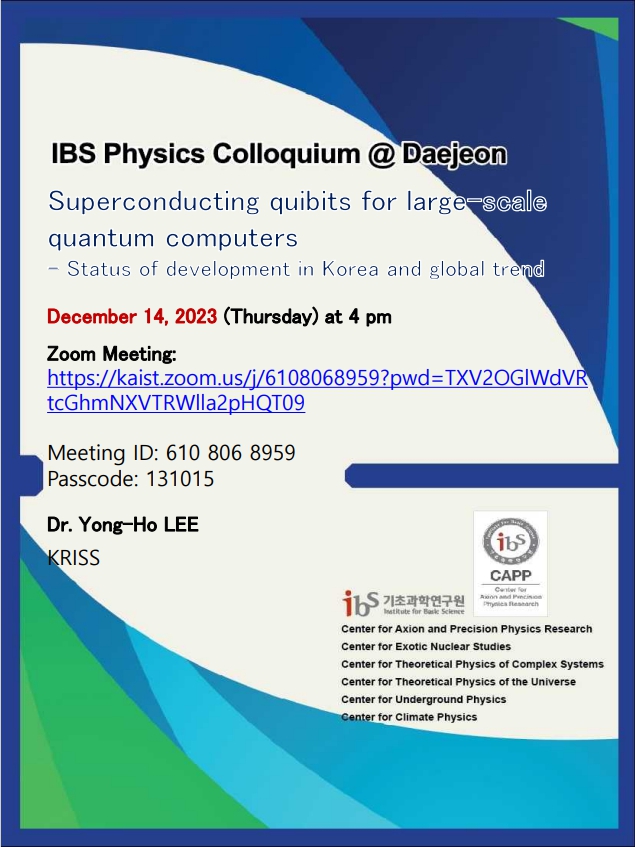Superconducting qubits for large-scale quantum computers
2023.12.08 17:14
| 날짜 | 2023-12-14 16:00 |
|---|---|
| 일시 | Dec14(Thur), 4PM |
| 장소 | CAPP Seminar Room C303, Creation Hall, KAIST Munji Campus |
| 연사 | Dr. Yong-Ho LEE (KRISS) |
물리학과 야니스 교수 연구실/액시온 및 극한상호작용 연구단 (CAPP/IBS) 입니다.
아래 세미나에 관심 있으신 연구자들의 참석을 요청드립니다.
CAPP seminars will be held. Anyone interested in this topic is warmly welcome.
Speaker: Dr. Yong-Ho LEE (KRISS)
Date: December 14, 2023 (Thursday)
Time: 4:00 PM (KST)
Venue: CAPP Seminar Room C303, Creation Hall, KAIST Munji Campus
https://kaist.zoom.us/j/6108068959?pwd=TXV2OGlWdVRtcGhmNXVTRWlla2pHQT09
Meeting ID: 610 806 8959
Passcode: 131015
Topic: Superconducting qubits for large-scale quantum computers - Status of development in Korea and global trend
Abstract:
Quantum computing is attracting much attention recently due to the possibility of superior computing capacity compared with the classical computers. Quantum computing is based on the advantage of quantum mechanical phenomena in qubits; quantization of states, superposition of the two states, and entangement between qubits. Among the possible platforms for the qubits, superconducting qubit has several advantages; fast gate operation, relatively long coherence time, high gate fidelity, best scalability of the superconducting circuits using semiconductor fabrication technology, mature and stable precision microwave and cryogenic technology, and easy-to-operate and reliable hardware. Therefore superconducting qubit is one of the most widely studied platform worldwide.
In the superconducting qubit, we control the two lowest energy states in the superconducting circuits, and its energy difference is equivalent to about 250 mK. Therefore we need to protect the qubits well from the environment thermal and electromagnetic interferences. And accurate and precise control of microwave pulses and quantum-limited measurement of microwave signals are needed for high-fidelity operation of the qubit system.
In the talk, I will introduce the basic concept of the superconductivity-based quantum computing, design and fabrication of superconducitng qubits, microwave control and measurement technology, and cryogenic and microwave components of the quantum computing system. And, the ongoing project for developing superconducting quantum computing system in Korea, and global trend for higher-performance quantum computing will be introduced.







